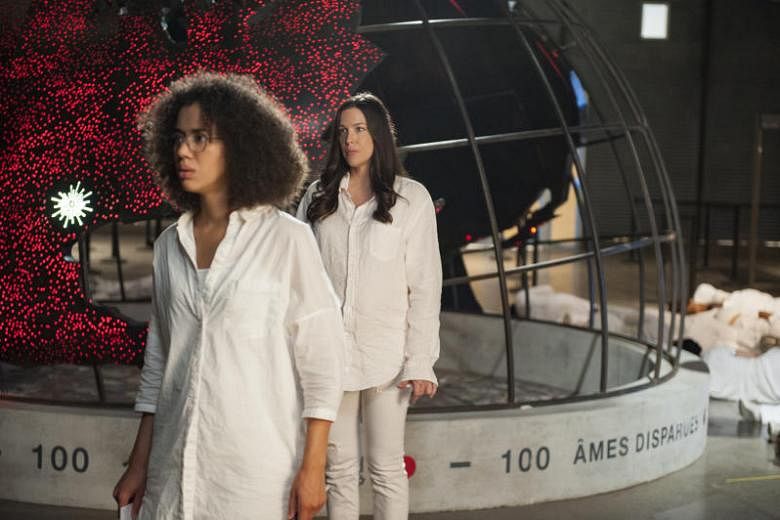NEW YORK • It has been seven years since Lost left television, but its co-creator Damon Lindelof knows many people will still assess Sunday's conclusion of The Leftovers through the prism of his most famous project, which disappointed some fans with its ending.
"The two most likely narratives are, 'Lindelof has sc***ed us over again' or 'Lindelof has redeemed himself'," he said a few days before Sunday's series finale. "Neither of those feel true to me, so I hope there's a third narrative: 'Here's how we feel about The Leftovers finale.' But I get that the former is more likely to happen in some circles."
A moving, at times hilarious and mystifying riff on love, loss and existential anxiety, The Leftovers was based on the 2011 novel by Tom Perrotta, who created the series with Lindelof. It concluded on Sunday night on HBO by reuniting Kevin Garvey and Nora Durst, the central couple played by Justin Theroux and Carrie Coon, and offering an idea about where those departed people ended up.
But as promised by the theme song, it let the show's broader metaphysical mysteries be, though Lindelof did confirm that "the reality you're watching in the finale is the same reality that we've always been in".
"Our culture doesn't want to take things at face value. I'm not saying The Leftovers is a simple show, but you can take it at face value."
In a telephone conversation, he discussed The Leftovers finale, Messiah complexes and Perfect Strangers actor Mark Linn-Baker.
How do you hope people feel about the finale?
I want people to feel like they have just taken their last bite of the meal and that they are sated, not ill.
How did the show end up differently from what you envisioned in the beginning?
The only way for me to do this show was to liberate it from the feeling of this is a mystery-based show and... there must be an answer. Therefore, it was more about discovering the show as we went. If you had told me in Season 1 that we would be exploring a Kevin Garvey may-or- may-not-be-the-Messiah narrative, I would've laughed. Yet, when we arrived there, it felt like it was inevitable.
You said the show would never explain the Departure and while the finale did not, Nora did describe the world where the departed ended up. When did you arrive at the concept of that other place being an inverted, even grimmer version of the world we saw?
First off, that is presupposing that Nora is actually telling the truth, which I will neither confirm nor deny. But let's just take her story at face value and assume it happened exactly the way she said it did.
The genesis of that idea goes back to the pilot, when we were shooting the scene when the young mother has her baby disappear. I said: "We should do one where we stay with the baby crying and... the mother is gone. And we understand one reality where 2 per cent of the world's population disappears, and another where 98 per cent disappears, and they coexist simultaneously."
That was the beginning of the idea. I felt like I needed to have some sense of where they might have gone, even if we were never going to reveal it.
When we started scratching at the reality that Nora may go to this place, that idea came back again. It was Perrotta who said: "It's a great idea, but I don't think we should see it." And thank God he did.
Because that risked giving some sort of answer to the central mystery?
That was part of it. The other part of it was, particularly in the third season, the show was about people telling one another their stories. There is no evidence to back the stories up, which is belief, religion and faith writ large.
How does that fit with taking the show at face value?
It is going to sound like a cop-out, but it is actually the whole point of the show, which is: It does not matter whether or not it is true. The actual truthfulness is irrelevant to the emotional result of having a system of faith and belief, if it helps bring people together.
How did Linn-Baker become a running character?
In Season 1, we were going around the writers' room one day, saying, "Who are the celebrities who disappeared in the Departure?" And Jackie Hoyt, a writer-producer, said: "Did you know the entire cast of Perfect Strangers disappeared?" We all busted out laughing and I was like, "We're doing that."
In the second season, we wanted to set up the idea that someone could fake a departure because of what happened to the three girls in the season premiere. So Linn-Baker faking his departure and hiding out in Mexico felt like a great idea and he was a good sport about it.
My understanding is that comedy comes in threes and we had done two Perfect Strangers gags.
We also needed somebody to pitch Nora this unbelievable idea about a gizmo that would transport you to where all the departed people went. It was like, "What if the messenger is even more ridiculous than the idea itself, does that make it more believable?" Then it was like: "It's got to be Linn-Baker."
NYTIMES

